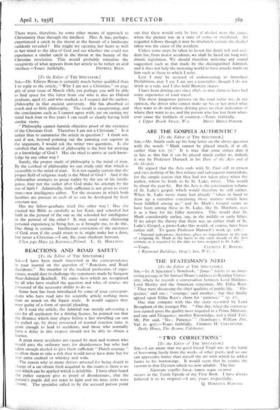REACTIONS AND ROAD SAFETY
[To the Editor of THE SPECTATOR.]
SIR, I have been much interested in the correspondence in your journal on the question of " Reactions and Road Accidents." No member of the medical profession, of expe- rience, would dare to challenge the statements made by Surgeon Rear-Admiral Beadnell. He states facts which are recognised by all who have studied the question and who, of course, are possessed of the necessary ability to do so.
Some heat has been introduced by some of your correspon- dents who have read into his scientific article nothing more than an attack on the liquor trade. It would suggest they were guilty of a form of special pleading.
As I read the article, the Admiral was merely advocating a test for all applicants for a driving licence, he pointed out that the distance which may elapse before a fast travelling car can he pulled up, by those possessed of normal reaction time, is great enough to lead to accidents, and those who normally have a delay in this respect should not be able to obtain a licence.
A great many accidents are caused by men and women who would pass the ordinary tests for drunkenness but who had taken enough alcohol to give them sufficient " Dutch courage " to allow them to take a risk they would never have done but for that extra cocktail or whiskey and soda.
The reason why so many drivers arrested for being drunk in charge of a car obtain their acquittal in the courts is there is no test which can be applied which is infallible. I have often heard the police surgeon give as proof of drunkenness, that the person's pupils did not react to light and his knee jerks were .absent. The specialist called in by the accused person point out that these would only be lost, if alcohol were the cause, when the patient was in a state of coma or moribund. An acquittal follows though it may be absolutely certain the alcohol taken was the cause of the accident.
Unless some steps be taken to lessen the death roll and acci- dent list, from motor accidents, we shall be faced ere long with drastic legislation. We should therefore welcome any sound suggestion such as that made by the distinguished Admiral, and it does not help the motoring world to have attacks made on him such as those to which I refer.
Lest I may be accused of endeavouring to introduce Prohibition, may I say I am not a teetotaller. though I do not drink as a rule, and I also hold Brewery shares.
I have been driving cars since I89g, so may claim to have had some experience of road travel.
The most dangerous persons on the road today arc, in my opinion, the driver who cannot make up his or her mind what they want to do and whose driving gives no clear indication of where they want to go, and the person who has lost from what- ever cause the instincts of courtesy.—Yours faithfully,














































 Previous page
Previous page